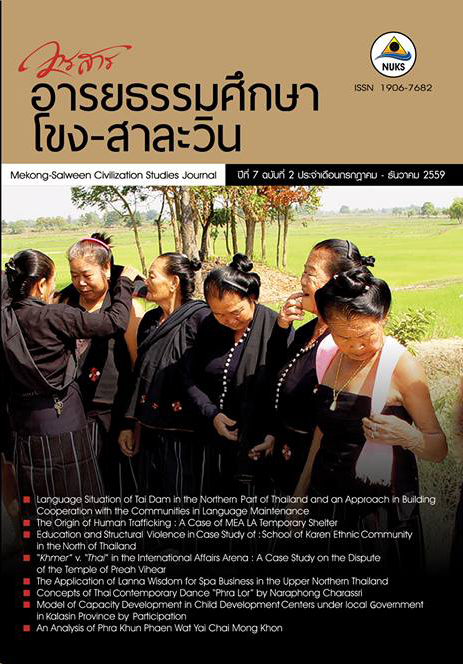The Origin of Human Trafficking : A Case of MEA LA Temporary Shelter
Main Article Content
Abstract
Because of the fighting between Burmese military and minority
groups in Myanmar, people from more than 13 ethnic groups have to migrate
to a “grey area” called the Mae La temporary shelter in Thasongyang district,
Tak province. The operation of the temporary shelter is under an agreement
between international organizations and the government of Thailand. This
policy leads to poor socio-physical conditions. Problems include DPFs’
socio-economic dependency. These conditions push displaced persons
from fighting (DPFs) who reside in the shelter to sneak out of the shelter to
seek for better living conditions, hence becoming the victim of human
trafficking. Therefore, Mae La temporary shelter has come to be an original
station of human trafficking in Thailand. The objectives of this article are to
uncover the status as origin of human trafficking of this shelter and to highlight
the key major factors that turn DPFs into human trafficking victims. The
authors adopted a mixed methodology including quantitative and qualitative
research, coupling with the walking map by geographic social information
system to explain routes of trafficking.
The results show that Mae La temporary shelter had status as the
origin of human trafficking process which affected DPFs residents inside to
be trafficked through 3 major factors: 1) low quality of life of “stateless people”
in the “grey area” from the shelter’s poor management and without good
governance; 2) The influence of consumerism in the outside society which
still face with the lack of planning for proper and sustainable development;
and 3) vulnerable status of DPFs as “stateless people” without cosmopolitan
status and labelled as persons with illegal status. The authors suggested
that to release Mae La temporary shelter of its status as the origin, it is crucial
to reconsider the existence of the shelter’s management as special area for
“stateless people” who should be considered as global citizen and has
universal human rights, the definition of “temporary” and empowerment
programs for increasing a better living and human rights among DPFs should
be a priority.


